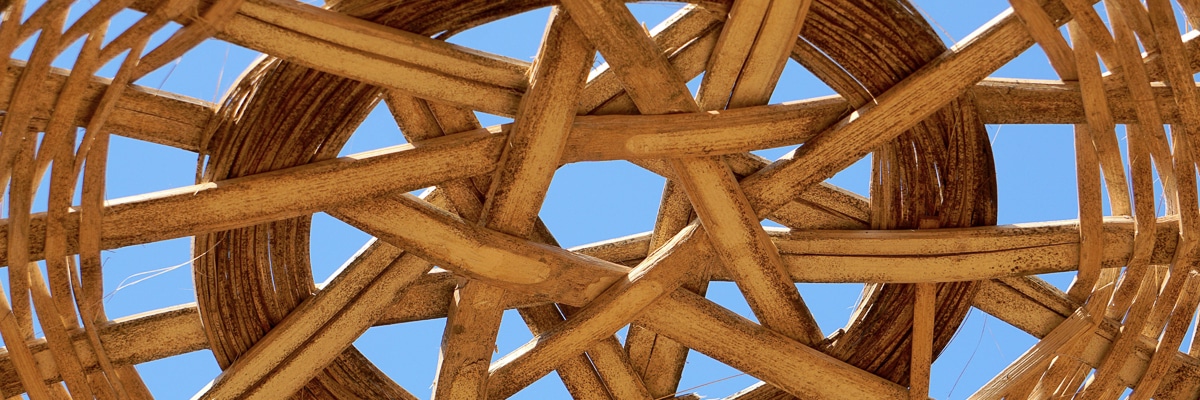
Randy and Edith Woodley explore interconnectedness through Indigenous traditions and language:
Traditional Native Americans feel a sense of interconnectedness at a deep level. We connect the physical to the emotional to the spiritual, and ourselves to one another and the natural world. We connect the whole community of creation to our civic responsibilities. In Indigenous thinking, there is no such thing as separation of one part of our life from another.
An example of the interconnectedness is found among the Lakota. Some of the most basic structures to Lakota life were the warrior societies. Yet there existed (and remains) a lifeway of harmony, expressed through a belief in the interrelatedness of all things. This included, for the Lakota, all the Sioux tribes, other tribes, and other humans, as well as all the animals, birds, insects, plants, and the rest of the community of creation. They express this interrelatedness through the words of a common prayer: mitakuye oyasin…. [1]
Giving credence to this idea—that all people and things are related to one another—opens us to immense possibility. What if we once again saw ourselves as family to the whole community of creation? We must come to the realization that all the world is our relative.
By realizing the connectedness of humankind to all animal and plant life, the Lakota believe that we become aware of new possibilities for preserving all living things. In humanity’s dependence on the Earth, the Lakota and others believe we can learn to sustain our planet and can find fresh prospects for nurturing food, conserving water, and developing renewable energy. All this and more is contained in their two simple prayer words: mitakuye oyasin, “All my relations.”
The Woodleys share the insight of an Iroquois teacher:
Tadodaho, also known as Chief Leon Shenandoah, commented:
The teachings are very good. The most important thing is that each individual must treat all others, all the people who walk on Mother Earth, including every nationality, with kindness. That covers a lot of ground. It doesn’t apply only to my people. I must treat everyone I meet the same. When people turn their thoughts to the Creator, they give the Creator power to enter their minds and bring good thoughts. The most difficult part of this is that the Creator desired that there be no bloodshed among human beings and that there be peace, good relations, and always a good mind. [2]
Like the Lakota concept of mitakuye oyasin, the Iroquois philosophy seeks to bring all people together in one accord by recognizing that all people and creation are inter-connected…. This way of living is substantiated among various Native peoples, so many of whom have a common value of harmony. Ojibway elder Eddie Benton Banai writes, “Today, we should use these ancient teachings to live our lives in harmony with the plan that the Creator gave us. We are to do these things if we are to be the natural people of the Universe.” [3]
References:
[1] The Woodleys continue: “Clara Sue Kidwell, Homer Noley, and George Tinker write in A Native American Theology: ‘A translation of mitakuye oyasin would better read: “For all the above me and below me and around me things.” That is, for all my relations…. It is this understanding of inter-relatedness, of balance and mutual respect of the different species in the world, that characterizes what we might call Indian peoples’ greatest gift to Amer-Europeans and to the Amer-European understanding of creation at this time of world ecological crisis.’” See A Native American Theology (Orbis, 2001), 51.
[2] Paul A. W. Wallace, White Roots of Peace: The Iroquois Book of Life (Santa Fe, NM: Clear Light, 1994), 14.
[3] Edward Benton-Banai, The Mishomis Book: The Voice of the Ojibway (Hayward, WI: Indian Country Communications, 1988), 9.
Randy and Edith Woodley, Journey to Eloheh: How Indigenous Values Lead Us to Harmony and Well-Being (Minneapolis, MN: Broadleaf, 2024), 128–131.
Image credit and inspiration: Georg Arthur Pflueger, Untitled (detail), 2022, photo, Germany, Unsplash. Click here to enlarge image. We are individual pieces in an intricately interconnected weave of reality; together we make a whole.
Story from Our Community:
The Daily Meditations constantly challenge and comfort me while shedding new light on my life’s journey. On my drive to work yesterday, I realized that my narcissistic father never encouraged me to trust myself, but rather look to him for answers instead. This lack of self-trust led to my habit of catastrophizing future events, trying to control the outcome. I understand now that I can rely on God’s presence within me to respond to uncertain situations if I am still enough to listen and allow it to come through. Thank you, CAC, for leading me to connect the dots.
—Doug S.




